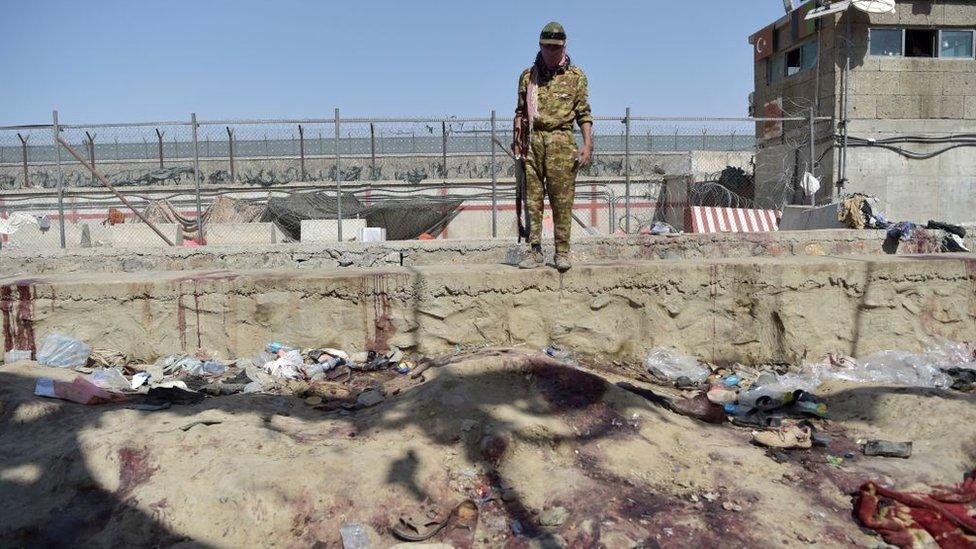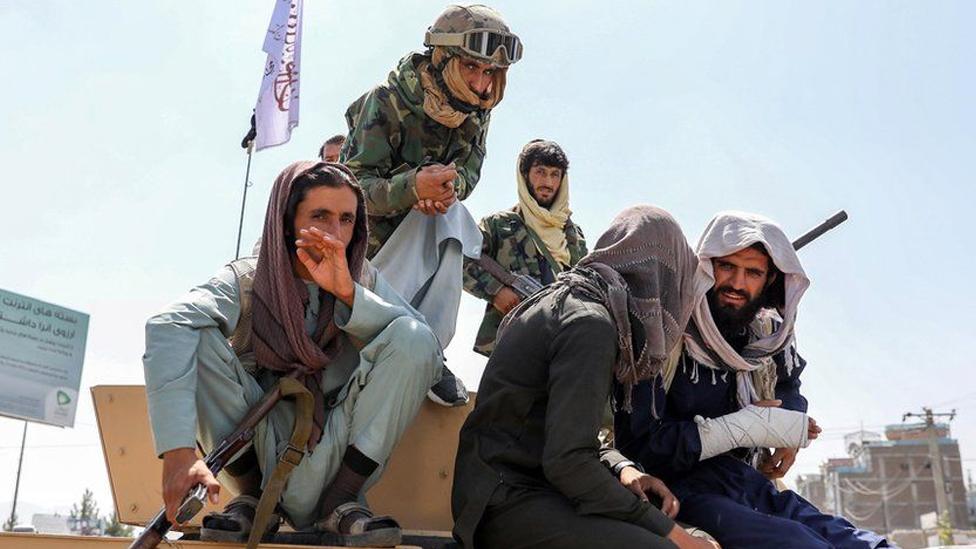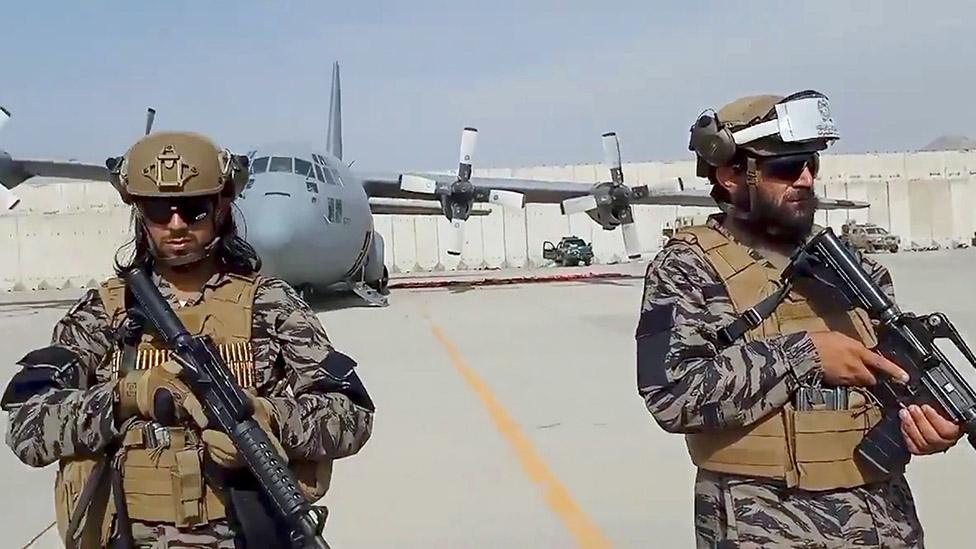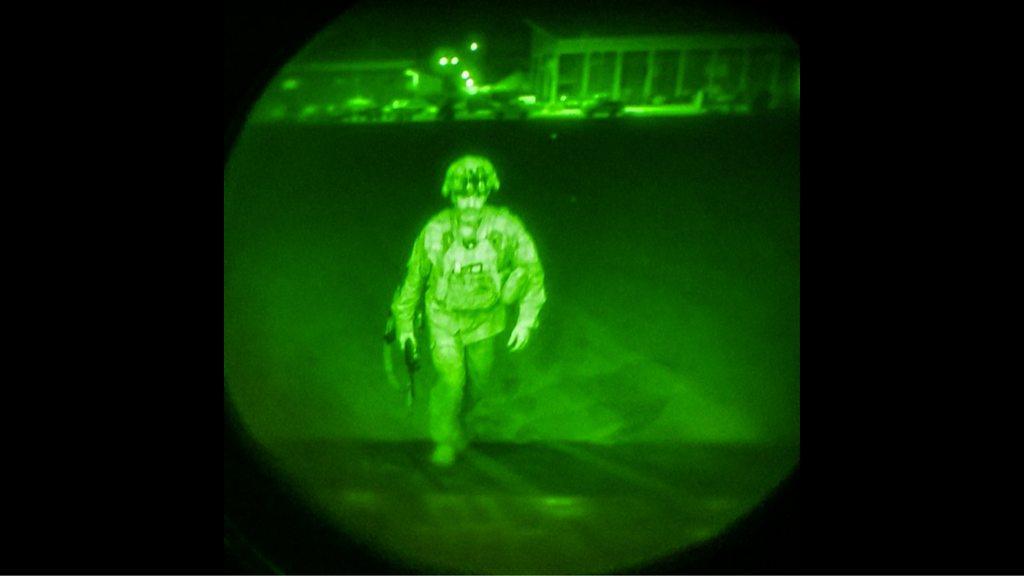Afghanistan: UK embassy told Afghans to go to Abbey Gate before suicide attack
- Published

A Taliban fighter stands at the scene of the attack, which killed almost 200 people
UK officials instructed Afghans to go to the Abbey Gate entrance to Kabul airport hours before Thursday's suicide bombing there, the BBC has learned.
Emails seen by Newsnight show that even though the UK and US deemed a threat to the airport to be imminent, the British embassy told people to "use the Abbey Gate [near] to the Baron Hotel".
Almost 200 people were killed in the explosion, including two UK citizens.
The UK government said it was investigating the emails.
One Afghan told the BBC that official UK advice on the day of the attack was "confusing and conflicting".
Before the last foreign troops left Kabul on Monday, thousands of people gathered at the gate daily in the hope of boarding a flight out of Afghanistan. Some had been called to the gate by the British authorities because they met the right criteria to be evacuated.
Another email, sent from the British embassy later the same day, asked a former Afghan interpreter whether he was in the right place. It read: "Please advise that you are at the correct gate? Abbey Gate on hawa on Shawasi Street."
The BBC has not named him to protect him from the Taliban.
"If I had followed their advice, I would be no more. I said I won't because I don't feel safe as the situation was getting worse," the former interpreter said.
"It would be madness to go there and that saved my life. It was our own judgement that saved our lives."

On 25 August, the day before the attack, the Foreign, Commonwealth and Development Office (FCDO) updated its guidance, warning against all travel to Kabul airport.
It said: "The security situation in Afghanistan remains volatile. There is an ongoing and high threat of terrorist attack. Do not travel to Kabul Hamid Karzai International Airport. If you are in the area of the airport, move away to a safe location and await further advice."
The US embassy in Kabul issued similar advice, saying that those "at the Abbey Gate, East Gate, or North Gate now should leave immediately".
On the morning of 26 August, the day of the explosion, the Armed Forces minister James Heappey told the BBC: "There is now very, very credible reporting of an imminent attack and hence why the Foreign Office advice was changed last night." He said it could happen in a matter of hours.
After the FCDO advice to stay clear of the airport was issued, there was confusion among many Afghans who had worked for the British. They did not know whether the advice to stay away from the airport applied to everyone - or only to those not already instructed to go to the airport for evacuation.
'Conflicting and confusing'
However, when staff tried to seek clarification from the FCDO, their emails went unanswered.
One Afghan woman who worked for the British embassy in Kabul said the UK advice to people wanting to leave the country that day was "conflicting and confusing". Again, she has not been named to protect her identity.
She said: "You should not be calling people to the gate when you know this situation.
"I'm surprised because if I was responsible, I would not be asking people to risk their lives. [The UK government] were not replying to my emails. I kept trying and asking them for safer route until, after the blast, I received [a] response, [to] which I was like: 'really?!'.
"I could have been one of those unfortunate people who was killed."
A UK government spokesperson told the BBC: "We did all we could to get individuals to safety in incredibly difficult and changing circumstances.
"We changed travel advice as soon as an increased terror threat was established and ensured that all call handlers communicated this advice as well as making it clear on the ground where we advised the crowds to disperse.
"We are investigating how an email against this advice could have been sent."
The final flights bringing British troops arrive in the UK
On Monday, Politico reported US officials had been planning to close the Abbey Gate. It said US forces kept the gate open to allow the UK to safely evacuate personnel from the nearby Baron Hotel - something the UK government has denied.
Prime Minister Boris Johnson's spokesman said it was "simply not true to suggest that we pushed to keep the gate open" and that the UK had moved operations out of the Baron Hotel "in response to the change in travel advice ahead of the attack".
Foreign Secretary Dominic Raab is due to face questions on Wednesday from the Foreign Affairs Select Committee on his handling of the situation in Afghanistan.
- Published31 August 2021

- Published31 August 2021

- Published31 August 2021
